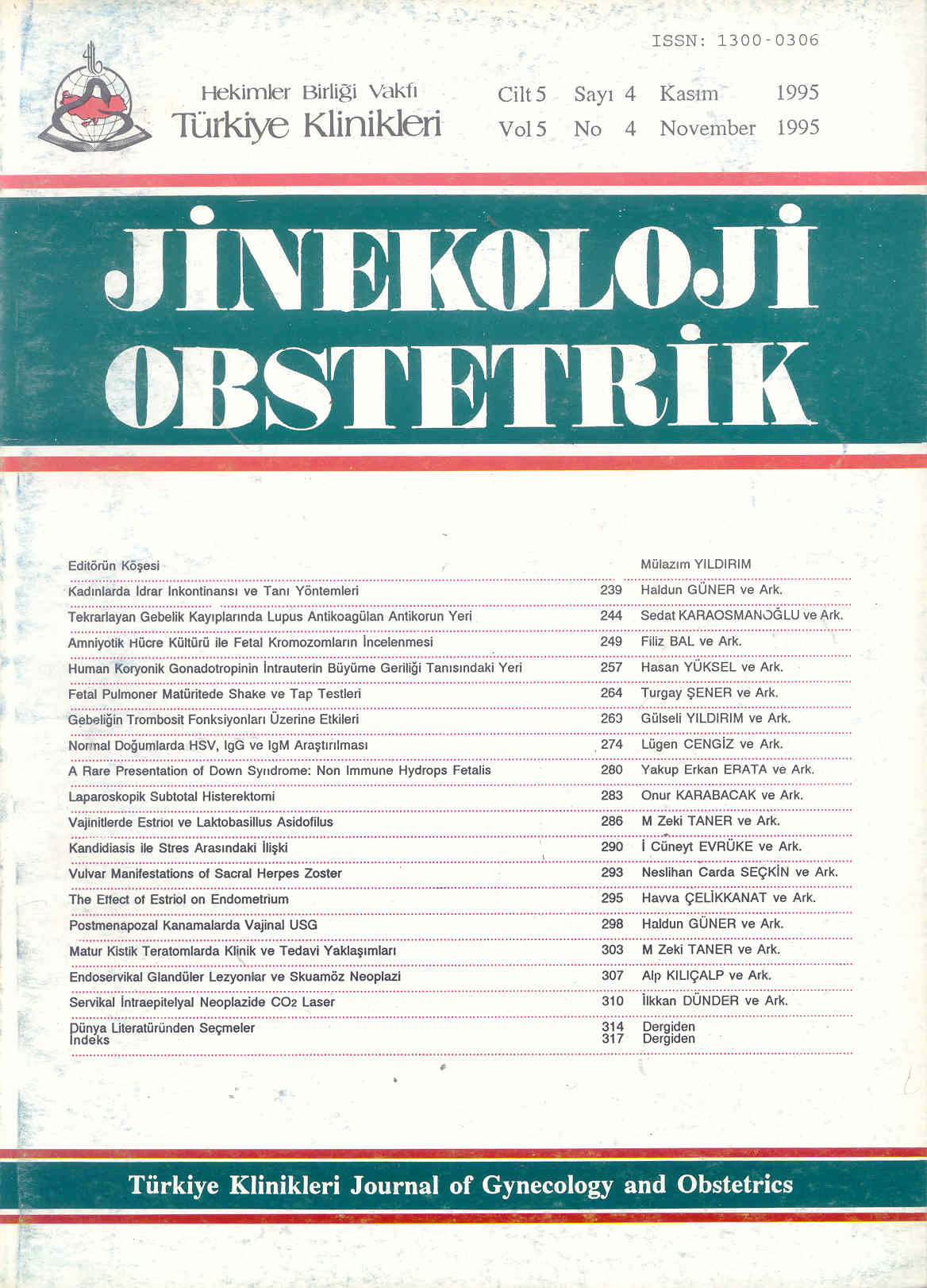Open Access
Peer Reviewed
ARTICLES
3356 Viewed2963 Downloaded
Investigation Of Fetal Chromosomes With Amniotic Cell Culture At The Pregnancies With High Risk Of Chromosomal Abnormality
Kromozomal Anomali Riski Taşıyan Gebeliklerde Amniyotik Hücre Kültürü ile Fetal Kromozomların İncelenmesi
Turkiye Klinikleri J Gynecol Obst. 1995;5(4):249-56
Article Language: TR
Copyright Ⓒ 2025 by Türkiye Klinikleri. This is an open access article under the CC BY-NC-ND license (http://creativecommons.org/licenses/by-nc-nd/4.0/)
ÖZET
Amaç: Kromozomal anomali riski taşıyan gebeliklerde amniyotik hücre kültürü yöntemi ile fetal kromozomların incelenmesi ve fetal kromozomal anomalilerin doğum öncesi dönemde tanımlanması. Çalışmanın yapıldığı yer: Gazi Üniversitesi Tıp Fakültesi Tıbbi Biyoloji ve Genetik AD. Materyel ve Metod: Bu çalışma Ocak 1994-Kasım 1994 tarihleri arasında yapılmıştır. Kromozomal anomali riski yüksek olan 30 olgu doğum öncesi sitogenetik tanı endikasyonları çerçevesinde belirlenmiş ve amniosentez sonucu gerçekleştirilen amniyotik hücre kültürü sonunda fetal kromozomlar incelenmiştir. Bulgular: Sitogenetik analizlerde 30 olgudan 4'ünde kromozomal anomali saptanmıştır. İleri anne yaşı risk grubunda 1 fetusta trizomi 21, 1 fetusta mozaik tetrazomi 12p (46,XX/47,XX,+i(12p), rutin gebelik ultrasonografisinde fetal anomali saptanan grupta 1 fetusta trizomi 18 ve anne yaşı 35'in altında olan, üçlü test'te yüksek riski belirlenmesi nedeni ile incelenen grupta 1 fetusta trizomi 21 saptanmıştır. Sonuç: Çalışmamızda elde edilen sonuçlar, ileri anne yaşının, kromozom anomalisinin oluşumunda önemli risk faktörü olduğunu göstermiştir. Anne yaşı 35'in altında olan ve düşük riskli kabul edilen grupta üçlü test'in, kromozom anomali riskinin belirlenmesindeki önemi vurgulanmış, aynı zamanda üçlü testin tüm gebeliklere tarama testi olarak uygulanmasının kromozom anomalilerinin özellikle Down sendromunun doğum öncesi yakalanmasını sağlaması açısından önemi ortaya konmuştur. Çalışmamız rutin gebelik ultrasonografisinde fetusa ait patolojik bulguların kromozom anomalili fetus olasılığını akla getirerek, genetik danışma gerekliliğini göstermesi açısından da önemlidir. Olgu sayısı arttırılarak devam edecek çalışmalar ile çok daha geniş ve sağlıklı veriler elde edilecektir.
Amaç: Kromozomal anomali riski taşıyan gebeliklerde amniyotik hücre kültürü yöntemi ile fetal kromozomların incelenmesi ve fetal kromozomal anomalilerin doğum öncesi dönemde tanımlanması. Çalışmanın yapıldığı yer: Gazi Üniversitesi Tıp Fakültesi Tıbbi Biyoloji ve Genetik AD. Materyel ve Metod: Bu çalışma Ocak 1994-Kasım 1994 tarihleri arasında yapılmıştır. Kromozomal anomali riski yüksek olan 30 olgu doğum öncesi sitogenetik tanı endikasyonları çerçevesinde belirlenmiş ve amniosentez sonucu gerçekleştirilen amniyotik hücre kültürü sonunda fetal kromozomlar incelenmiştir. Bulgular: Sitogenetik analizlerde 30 olgudan 4'ünde kromozomal anomali saptanmıştır. İleri anne yaşı risk grubunda 1 fetusta trizomi 21, 1 fetusta mozaik tetrazomi 12p (46,XX/47,XX,+i(12p), rutin gebelik ultrasonografisinde fetal anomali saptanan grupta 1 fetusta trizomi 18 ve anne yaşı 35'in altında olan, üçlü test'te yüksek riski belirlenmesi nedeni ile incelenen grupta 1 fetusta trizomi 21 saptanmıştır. Sonuç: Çalışmamızda elde edilen sonuçlar, ileri anne yaşının, kromozom anomalisinin oluşumunda önemli risk faktörü olduğunu göstermiştir. Anne yaşı 35'in altında olan ve düşük riskli kabul edilen grupta üçlü test'in, kromozom anomali riskinin belirlenmesindeki önemi vurgulanmış, aynı zamanda üçlü testin tüm gebeliklere tarama testi olarak uygulanmasının kromozom anomalilerinin özellikle Down sendromunun doğum öncesi yakalanmasını sağlaması açısından önemi ortaya konmuştur. Çalışmamız rutin gebelik ultrasonografisinde fetusa ait patolojik bulguların kromozom anomalili fetus olasılığını akla getirerek, genetik danışma gerekliliğini göstermesi açısından da önemlidir. Olgu sayısı arttırılarak devam edecek çalışmalar ile çok daha geniş ve sağlıklı veriler elde edilecektir.
ANAHTAR KELİMELER: Kromozomal anomaliler, amniyosentez, prenatal tanı
ABSTRACT
Objective: Investigation of fetal chromosomes with amniotic cell culture at the pregnancies which have high risk of chromosomal abnormality. Institution: Medical Faculty, Gazi University, Department of Genetics and Medical Biology. Material and Methods: This study, has been made between January-November 1994. In our study 3 cases chosen under circumstances of antenatal cytogenetic diagnostic indications were evaluated for fetal chromosomal abnormality by amniocentesis. Findings: We founded 1 fetus with trisomy 21, 1 fetus with mosaic tetrasomy 12p (46,XX/47,XX+i(12p) in advanced age mother risk group, 1 fetus with trisomy 18 in the group in which fetal anomaly was detected during routine ultrasonography and 1 fetus with trisomy 21 in the high risk triple test group (mothers age under 35). Results: Results obtained indicate that advanced maternal age is the most important risk factor in the formation of chromosomal anomaly. The importance of triple test in determining the risk of chromosomal anomaly is well emphasised in the group with mothers aged under 35. Our study also indicates the importance of genetic consultation because the pathologic signs in routine obstetric ultrasonography might signifiy the fetus with chromosomal anomaly. Increased number of cases are needed to be able to reflect more conclusive results.
Objective: Investigation of fetal chromosomes with amniotic cell culture at the pregnancies which have high risk of chromosomal abnormality. Institution: Medical Faculty, Gazi University, Department of Genetics and Medical Biology. Material and Methods: This study, has been made between January-November 1994. In our study 3 cases chosen under circumstances of antenatal cytogenetic diagnostic indications were evaluated for fetal chromosomal abnormality by amniocentesis. Findings: We founded 1 fetus with trisomy 21, 1 fetus with mosaic tetrasomy 12p (46,XX/47,XX+i(12p) in advanced age mother risk group, 1 fetus with trisomy 18 in the group in which fetal anomaly was detected during routine ultrasonography and 1 fetus with trisomy 21 in the high risk triple test group (mothers age under 35). Results: Results obtained indicate that advanced maternal age is the most important risk factor in the formation of chromosomal anomaly. The importance of triple test in determining the risk of chromosomal anomaly is well emphasised in the group with mothers aged under 35. Our study also indicates the importance of genetic consultation because the pathologic signs in routine obstetric ultrasonography might signifiy the fetus with chromosomal anomaly. Increased number of cases are needed to be able to reflect more conclusive results.
MENU
POPULAR ARTICLES
MOST DOWNLOADED ARTICLES





This journal is licensed under a Creative Commons Attribution-NonCommercial-NoDerivatives 4.0 International License.










